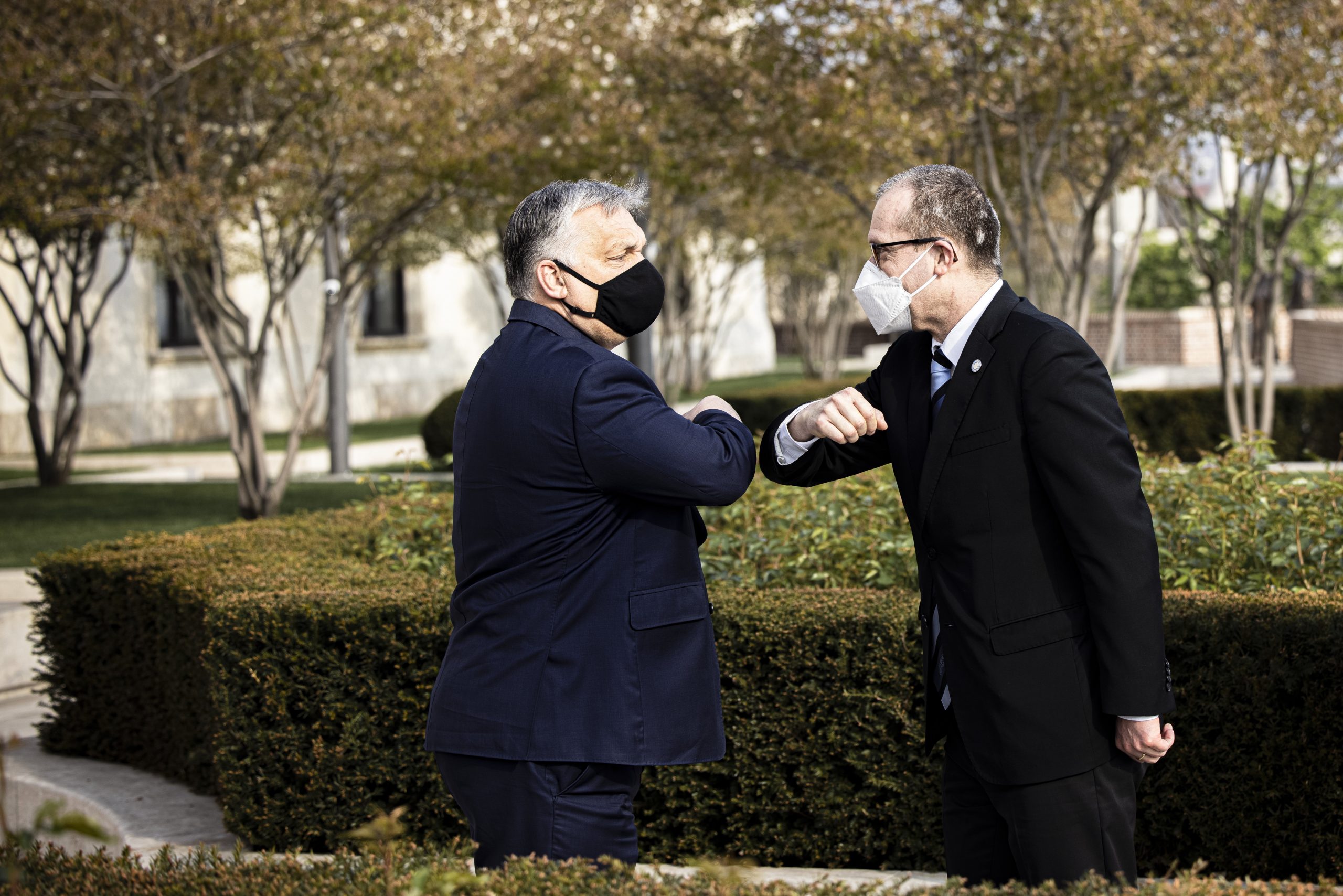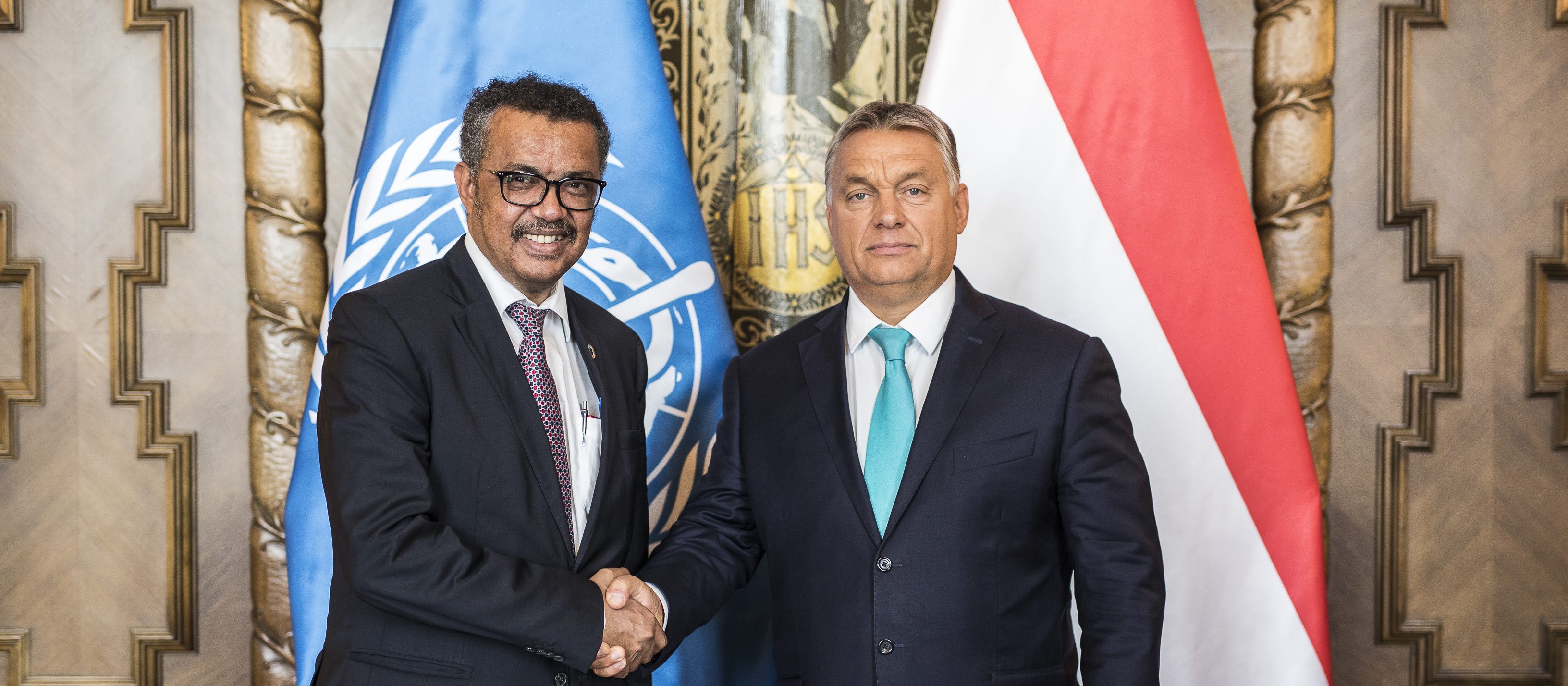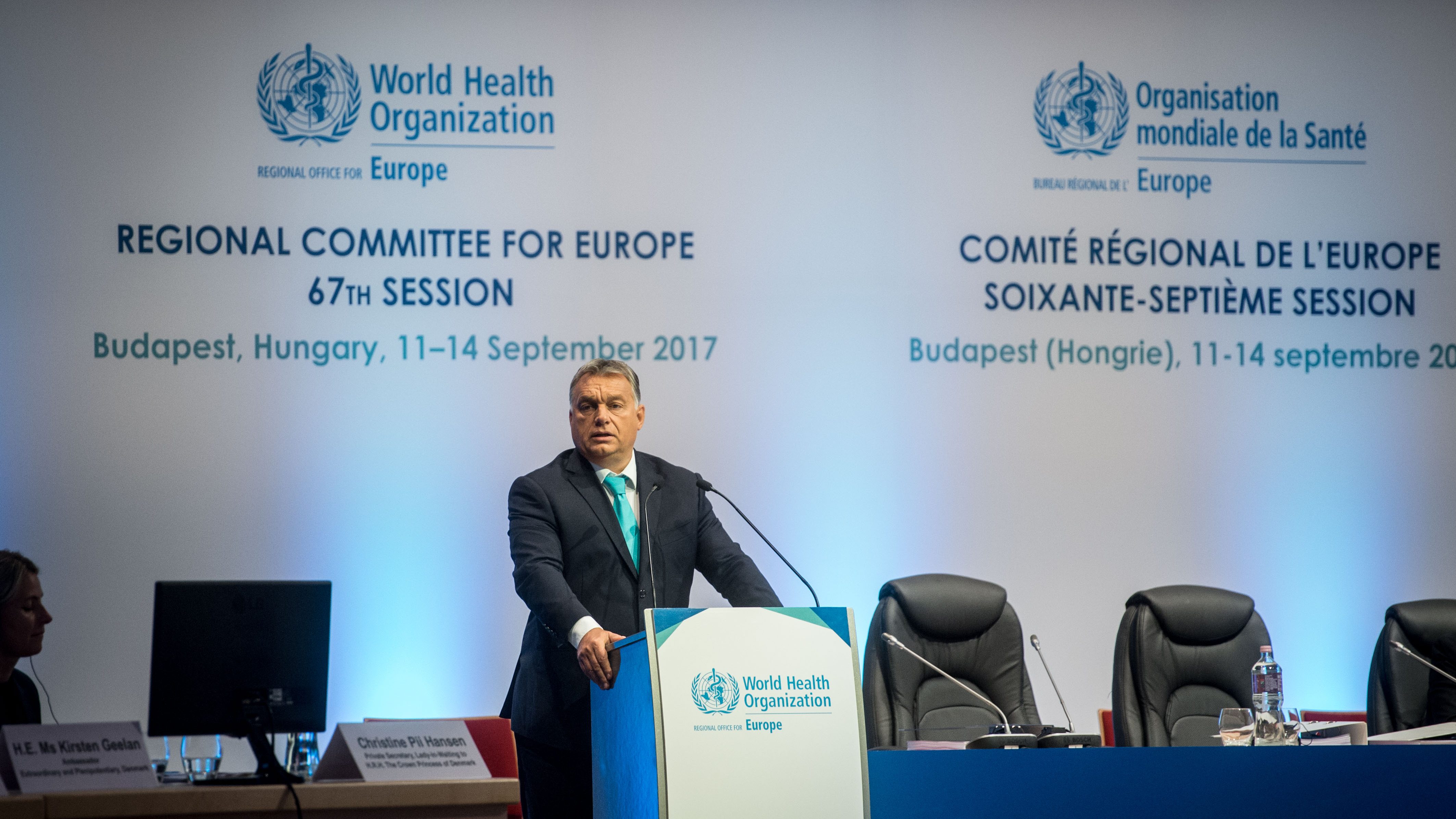
Your Majesty, Director-General, President, Regional Director, Your Excellencies, Madam Ambassador, Ladies and Gentlemen,
I consider it an honour that the UN World Health Organization chose Hungary, and its capital Budapest, as the venue for this session of its Regional Committee for Europe. I would like to thank you in person for the opportunity to be here with you. Thank you also for starting my week so well: with music, rather than with battles. In my line of work this is a rare gift. It’s a great pleasure for us to play host to the more than six hundred participants at this event, who include healthcare specialists and decision-making executives from the 53 countries of our region. In an opening speech such as this there are two things I must speak about: first of all, I must express Hungary’s respect and appreciation for your organisation; and secondly I must call your attention to a few examples from our life here that may be relevant to this meeting.
Ladies and Gentlemen,
The WHO is a global organisation. Those of you who are familiar with the world of politics see daily evidence that the tension between nation states and the forces of globalism is central to the world’s great controversies. You can see the fierce criticism directed at the current global order, even some rebellion in certain areas, and the current difficulties a number of global organisations are experiencing. Meanwhile, amidst the general criticism directed at global institutions, we never hear a single critical comment about the WHO. Whatever one may think about the relationship between sovereign states and international organisations, everyone appreciates that this is an organisation which at all times and in all circumstances has always been needed, and will continue to be needed in the future. We Hungarians are also at the centre of such a debate, and we believe that we must defend our freedom against imperial political aspirations; this position is not one that denies the need for global institutions, but one that instead seeks reconciliation between the supranational level and national sovereignty. So today you are guests of a country that often criticises global institutions, but this criticism does not extend to the WHO. Indeed the reverse is true: you are in a country that has the utmost appreciation and respect for the WHO.
Ladies and Gentlemen,
Our Central European region was built on the moral foundations of responsibility: for both ourselves and our neighbours. This means that, beyond our immediate families, we are equally responsible for the health of the members of our wider communities, our settlements, our nation, and the people of our region. In 2011, when we created a new Fundamental Law amidst enormous debates, we laid down in it that everyone has the right to physical and mental health: this is stated in the current Hungarian Constitution. The WHO also stands for this obligation, this attitude of shared responsibility for other people, and this set of values. This is one reason for your organisation being so well-respected in our country. Hungary is a committed member of your organisation. We who were born in the more fortunate parts of the world and who are privileged to live in its more prosperous regions see the importance of efforts to ensure that everyone should be able to live in healthy circumstances – no matter where they were born, or wherever their homes may be.
Ladies and Gentlemen,
As I understand it, the purpose of this meeting is also to discuss the national healthcare challenges experienced by the region in the context of global problems. Here one quickly runs up against problems, as certain phenomena can take on a radically different aspect depending on whether one looks at them from a global or a regional viewpoint. One such topic is demography. We often talk about a rise in the world’s population, an increase in global population figures and the resultant challenges; but in our region, in a number of countries in Europe – including Hungary – the most urgent problem is population decline. And there is a point where these two challenges intersect to create a third challenge: mass migration.
Ladies and Gentlemen,
Population decline is a problem for Europe which requires our urgent attention. You, too, know that a number of solutions have been proposed for this. There is a plan which seeks to solve the European population problem with migration. Several international organisations take this position, while there are countries, nation states, which are opposed: they wish to respond to this challenge not with migration, but by strengthening family policy. We who look at this issue from close up have concluded that problems must be dealt with where they originate; we would only worsen problems by taking a share of them on ourselves. Here in Europe we have everything needed in order to help: we have knowledge, thanks to modern medicine, thanks to our excellent and dedicated doctors, and thanks to our good universities; and we also have the economic strength needed, thanks to the performance of the European economy. So we have everything we need to launch targeted healthcare programmes in regions outside our own where they are most needed. And we also have all the ability needed to put together a long-term strategy with which we can raise up those regions now stricken by war, anguish and despair.
Ladies and Gentlemen,
My second task is to present you with a few examples of measures which in recent years my country has implemented in the field of the nation’s health. You are unable to directly savour the fine language that I am now speaking, but I’d like to impress upon you the fact that Hungarian is an ancient language, and – as is generally the case with ancient languages – it offers a precise description of those things that truly matter. In the Hungarian language the word “health” is a very special one: its full sense can’t be easily conveyed in translation, as in Hungarian the word “health” is clearly formed from the word “whole”. The word “whole” denotes health, and this reflects the ancient belief that one is healthy if one is whole and able to lead a full life. In Hungarian the essence of the terms “whole life” and “health” are linked, and therefore it’s important that when we discuss our future prospects we shouldn’t just talk about life expectancy at birth, but also about the number of years spent in good health. And in this department Hungary is not yet doing well.
Ladies and Gentlemen,
There are three action plans currently under way in Hungary which may be of interest to you. We launched all three action plans some years ago, and they attracted much international interest. We adopted new approaches, and our plans aimed to create a new balance between the interest groups concerned.
The first of these action plans is the job protection action plan, which set out to eliminate unemployment. This is based on the conviction that if there is no work there is no self-esteem, there is no vision, and there are no children. In such circumstances there is likewise no point in aspiring to a healthy lifestyle. In seven years we have reduced unemployment from 12 per cent to around 4 per cent, and in our country full employment is almost within reach.
The second action plan currently under way in Hungary is a demographic action plan, which seeks to slow down and halt population decline, and eventually to reverse that decline. A few years ago, before we launched our demographic action plan, the total fertility rate was 1.25. In six years we’ve managed to increase this to 1.49. The declared goal of this demographic action plan is to increase the total fertility rate to 2.1: in other words, to enable our national community to maintain its size – or expand – biologically and in a self-sustaining manner. Therefore population policy is at the heart of Hungary’s economic policy.
The third action plan now in its implementation phase in Hungary is the national health action plan. This comprises three sub-plans, and it involves three major battles or clashes – at times even war. The number one priority of our national health action plan is the war on smoking. In 2010 we Hungarians had the highest rate of lung cancer in the world. Our experts said that smoking accounts for 90 per cent of this high rate of disease related to lung cancer. Here in the country hosting you this week, smoking has been prohibited in indoor public spaces – and many outdoor ones – since 2012. In addition we have engaged in huge political debates leading to the radical reform of the entire retail sector for tobacco in Hungary, and we have placed it under strict regulation. These restrictions have already produced results. Data published in 2014 shows that in Hungary between 2012 and 2013 the number of regular smokers decreased from 28 per cent to 19 per cent. Our second battle in the national health action plan is against the consumption of unhealthy foods. We have imposed a tax on foods containing high levels of sugar and salt and other unwholesome ingredients which present proven health risks. This is referred to colloquially as the “crisps tax”. The revenue from this tax – which amounts to some half a billion euros – is channelled into the healthcare system. We have managed to restrain our financial experts within the Government – who always have a healthy appetite – and this sum has been ring-fenced for health care, where we have mainly been able to use it to improve pay and conditions for healthcare workers. Thanks to this tax, 40 per cent of manufacturers have changed the balance of ingredients in their products, 70 per cent of them reducing the quantity of harmful ingredients and 30 per cent removing them completely. Meanwhile the sales of products affected by the legislation have decreased by 27 per cent. The third battle we have fought within our national health action plan is the reform of meals in the public sector, focusing on providing children with healthier food. At present the results are mixed, and we still have a lot of work to do. Having mentioned our children, I’d also like to say that we have integrated sport into the daily lives of young people. Hungary is a great sporting nation in terms of competitive sport and its record in winning Olympic gold medals, but we’re far behind the global vanguard when it comes to healthy lifestyles. Therefore we have introduced mandatory daily physical education lessons in our elementary schools, in which 1.2 million children – one million two hundred thousand children – now take part. The national health action plan addresses another task in which we still have a very long way to go, and which is a particular problem in Hungary: deaths due to cancerous diseases. We’ve had reliable figures since the turn of the millennium, and we can see that, with some minor fluctuations, every year malignant tumours result in 33,000 thousand deaths: one quarter of the total number of deaths. You yourselves know only too well that the most painful deaths are always those which could have been prevented with screening, and this is true of a large number of cancers. In recent years we have built a systematic and targeted national health screening system in order to halt the increase in these conditions. I look forward to the initial results with great anticipation.
Ladies and Gentlemen,
I have informed you about three action plans: the action plan seeking to protect jobs; the action plan which seeks to achieve a demographic turnaround; and an action plan for the long-term preservation of Hungarians’ health. I would like to thank the WHO for having supported these programmes of ours in the past few years. Thank you for having helped our work with your professional advice. Thank you for monitoring our progress. Thank you for consulting with us. And thank you for being generous with words of praise and awards in those areas where we have achieved results. Hungary has not forgotten this, and wishes to thank you. I’m convinced that the WHO is an important organisation that has no rival in the coordination of international efforts made in the battle for health.
Ladies and Gentlemen,
As I have said, we have everything needed in order to help, but we need an organisation which coordinates the efforts of the various countries. I would like to reassure you that Hungary stands by the WHO: in the future you can rely on us; and we would like to rely on you.
All that remains, Ladies and Gentlemen, is for me to wish you a successful session, and a useful and beautiful stay in Hungary.
Thank you for your attention.


